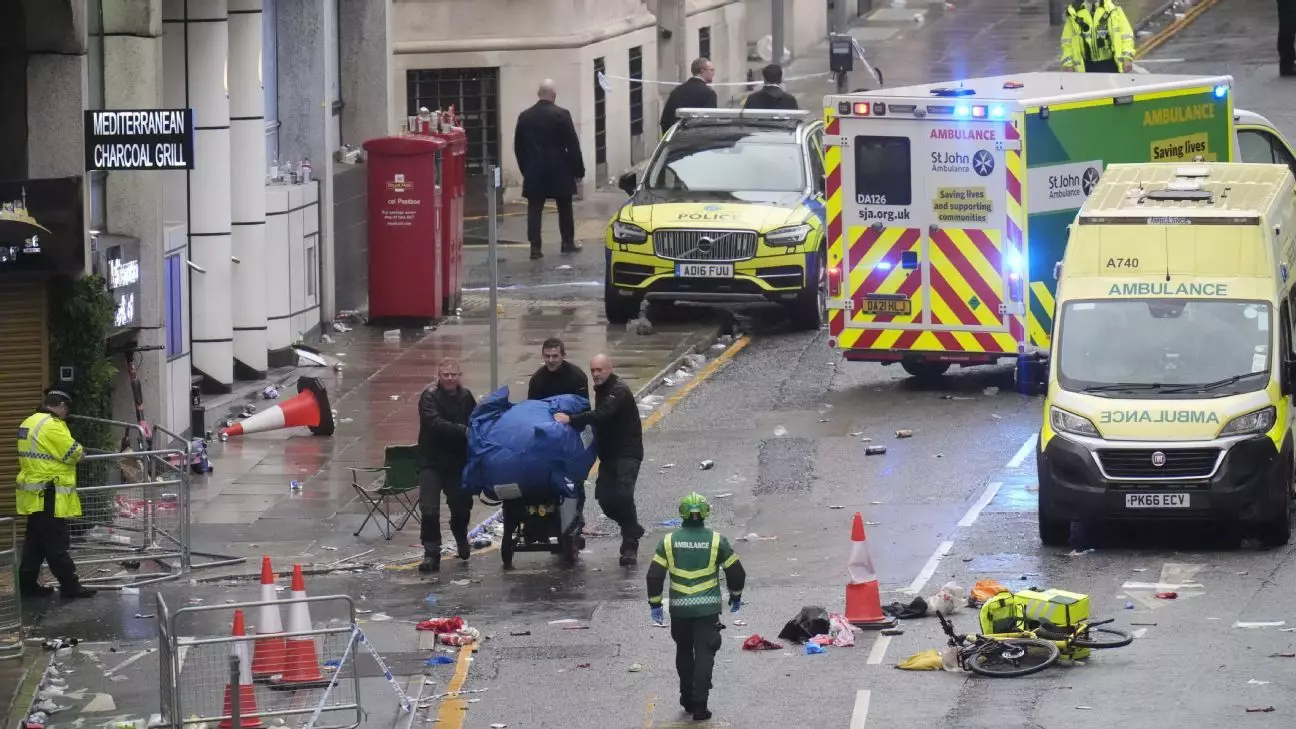In an era when victories are celebrated with exuberance and joy, the heart-wrenching incident that unfolded during Liverpool Football Club’s Premier League victory parade serves as a bitter reminder of the unpredictable nature of public festivities. What was supposed to be a jubilant gathering of thousands turned into chaos as a car crashed into pedestrians, leaving 47 injured, including young children. The juxtaposition between communal celebration and individual recklessness highlights an uncomfortable reality: even in moments of collective joy, the potential for tragedy looms ever-present.
This particular incident sheds light not only on the chaos that can arise from such gatherings but also raises critical questions surrounding public safety. A 53-year-old man from the Liverpool area was arrested, but the police have stated that terrorism was not a motive. While that may provide some relief to the public, it does not ultimately dispel the discomfort brought forth by the event. In a society eager to celebrate achievements, are we adequately prepared for the dangers that can intrude upon our festivities, even inadvertently?
The Flawed Response to an Unthinkable Act
The immediate aftermath of the incident saw a rapid response from emergency services, with police and ambulances filling the streets of Water Street. Though swift, the response coupled with the arrest has sparked a narrative that oscillates between accountability and a desperate need for understanding. The description of the driver as a white British man could lead some to overlook deeper systemic issues. When an individual acts recklessly—whether in a moment of delirium, negligence, or despair—the ramifications ripple through the lives of others. The apathetic notion of attributing blame solely to the driver fails to encapsulate the broader societal factors that underpin individual actions.
Statements from figures like Prime Minister Keir Starmer underscore the gravity of the incident, with words of empathy directed toward the victims. However, simply expressing condolences raises the question: how often do these sentiments materialize into meaningful action? The Premier League, the club, and even organizations such as FIFA have offered their thoughts and prayers, which, while well-intentioned, can feel insufficient in the face of trauma. As the shock of such events fades, so too does the urgency to examine and address underlying issues that culminate in tragedy.
The Role of the Media and Public Discourse
In the age of social media, videos and photos capturing the sensational nature of the incident spread like wildfire. These narratives dominate public discourse, often reinforcing fearful perceptions while overshadowing the voices of those actually affected. Harrowing glimpses into the chaos do serve a purpose, keeping the public informed. However, the cavalier attitude with which many consume these stories can shift focus away from crucial discussions about safety, accountability, and the support needed for victims.
The balance of exploring sensationalism while respecting the dignity of those involved is often precarious. Speculation following the arrest clouds the judgment of many, tempting the public and media alike to leap to unfounded conclusions, forgetting that before any labels are attached to the incident—be it reckless driving or absurd negligence—lives are still shattered in the wake of one person’s momentary lapse in judgment.
The Call for Change
As the city of Liverpool attempts to come to terms with what transpired, it stands at a critical crossroad. Beyond mourning the injured, there lies an opportunity to foster discourse about community safety, public awareness, and accountability at events that gather large crowds. Celebrations should not come at the expense of safety or psychological trauma, and we must advocate for measures that can mitigate risks moving forward.
Furthermore, civic leadership must prioritize public awareness campaigns about pedestrian safety during large gatherings. The mental and emotional toll on the community extends far beyond the physical injuries sustained. Thus, empathy must evolve into actionable steps that address the root causes of such disruptions. Liverpool, renowned for its football spirit, is now challenged to embody resilience—not merely in victory but in its response to unexpected calamities.
The tragic episode during the Liverpool celebration shines a light on the fragility of joyous moments, underlining our societal responsibility to create spaces where happiness is not marred by fear. We can celebrate our triumphs while holding ourselves accountable for the safety of all.


Leave a Reply